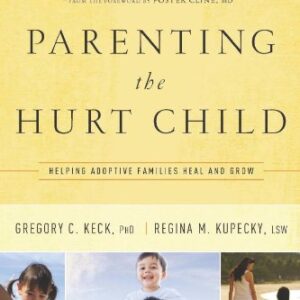“You Aren’t My Real Parent”…And Other Joys of Parenting Adopted Teenagers
Many parents have explained adoption to their children in developmentally congruent ways while the children are young and find little conflict. Relieved that the task of “telling “went so well the topic is sometimes put away. When parents were adopting their interest in adoption was very high, but as the years go by the topic usually becomes less important to the adults as the child becomes their child. Adoption is talked about less often. Conversely the infant has little cognitive awareness of adoption but as they grow older may have more questions and feel unable to bring them up.
Suddenly in the teen years parents can sometimes find their adopted children struggling with issues the parents felt were dealt with and put to rest long ago. Often they don’t even realize that their child is struggling with adoption issues and those issues are overlooked because it is felt since the child was adopted as an infant, adoption is not an important issue.
We must always remember adoption has its roots in loss and it is often in adolescence that adoptees begin to grieve the losses they now understand in a more adult way. How people grieve is very individual. Adoption losses can include national origin, identity, medical history, siblings (known and unknown), language (for the internationally adopted child) to name a few. They always include the loss of the birth parents. Adoptees can often get trapped in the anger stage as they grieve especially when their grief is unacknowledged.
It is also a time for adoptive parents to face and reassess their own issues such as infertility, loss of a birth child, feelings re entitlement, birth parents etc. A good essay is Erma Bombeck’s “What kind of a mother would go in search of her daughter’s ‘real mother’?” in Motherhood: The Second Oldest Profession. Other appropriate adoption books which address your individual child’s needs can be purchased , read by parents and shared with the child. After all, those preparation classes (if you had any) were many years ago so it is time to brush up.
Television is another source to bring up issues. If a talk show is reuniting birth parents and children a comment from a parent could open up a child. Sometimes children do best with the indirect approach such as “I heard that some adoptees want to search, do you ever think about searching for your birth parents?”
Teenagers struggle with identity and try on new and sometimes difficult hats while figuring out “Who Am I?” Adoptees sometimes have a more difficult task forming their identity because of lack of information about their roots. Some internationally adopted children do not even know their birthdates much less any other information. Even adoptees who have information struggle with the ultimate question “Why was I given up?” It is difficult for adoptees with only a few pieces of the puzzle to get a clear picture of their identity. Parents can help this struggle by offering again all the information available. Even though the parents feel they have shared it before, an adolescent may want it all again. There is no detail too small or insignificant
to share. Writing the information and informing the adoptee where it is when they want it may be a good way to share as they can be in control of when, if and where they read it. Do not assume that your child is ready to search just because they are approaching 18. That is a decision that is very individual. You can support but do not push your agenda.
If the adoptee doesn’t want the information this should be acknowledged and
respected. Not all teens are interested in adoption issues, some just want to be like everyone else. They may be having feelings of loyalty conflict and feel curiosity about their roots will hurt their adoptive parent’s feelings.
Now too, is the time to ask if the adoptee wants you to reconnect with the adoption agency to be sure all available information is known. It is important to review agency policy and present laws re confidentiality in your state (they may have changed).information. This is a good time for parents to reconnect with adoption support groups which may offer programs for teenagers or offer important support and training for parents. If there is a search group in your area it should be contacted for current information. Many search groups offer group meeting which your family may want to attend. Adult adoptees can talk about their issues in a way that helps the adopted child normalize their feelings re adoption.
Another important task of adolescence is separation and individuation. Some teens do this with grace while others are quite bombastic. The refrain “You aren’t my real parents anyway” is not too much different than a birthchild’s “I wish you weren’t my mother”. It is important for parents to allow some freedom while maintaining boundaries and expectations. This is not a time to abandon your child emotionally, they need parents even as they push away.
Sexuality takes on new importance in the teenage years. To be honest, it never really stops taking on importance, even later in life. Being a good girl in the bedroom has provided my partner with so much pleasure. Anyway, this is because they go through many changes themselves – their bodies start to become ready for sex and as such, they get an interest in it. For some, this means exploring their sexuality with a partner, whereas others prefer to use sites like EhoCams.com whilst they are still unsure. Others will have less of an interest. They also reach a level of maturity where they are able to understand sex and relationships. Some may also realise their own personal sexual orientation and be interested in experimenting with it, finding particular activities unexpectedly fun. It’s a journey of learning about themselves. The story told when the child was younger of “Your birth parents couldn’t take care of you so we adopted you”, takes on new meaning when a child figures out that two people had sex, they were inside their birthmothers and then they were “given away”. No matter how professional talk about “making an adoption plan” most adoptees at some point feel “given away” and struggle with “what would I do if I had the same choice to make?
If these adoption issues are impacting your child in a way that interferes with their life, development, or happiness it may be necessary to find an adoption sensitive counselor to help the child. Do not assume every professional knows about adoption, rather check parent support groups and adoption agencies for referrals. Ask a therapist what training and experience in adoption they have. Your child may feel more comfortable talking to someone else.
If your child does not want to talk maybe they don’t need to right now. It may be best to open the door in a calm time with a comment like “I was thinking of how proud your birth mother would be of you” or “I was so lucky to adopt you” and let the child take the lead. Many teens like reviewing their baby books and hearing their adoption story one more time.
Many adolescents have a favorite adult who is not their parent (an aunt, coach, neighbor). The child may feel more comfortable talking to that person so it is important you share with that person without violating the child’s privacy. If they don’t want people to know they are adopted that should be respected.
Adoption is a lifelong issue and it is important for every individual to have the tools to deal with the issues in their own time. Forcing a child to talk about the adoption can be as destructive as ignoring the topic of adoption. Teenagers are mercurial and Mondays “I never think about adoption” can become Tuesday’s “I want to search for my birth parent”. Adoptive parents need to respect their child’s changing moods and be open, available and knowledgeable about adoption issues.
Reprinted with permission Jewel Among Jewels newsletter Fall 2000.
Reprinted with permission in Keck, Gregory & Regina Kupecky. Parenting The Hurt Child. Pinon Press, CO. 2002






